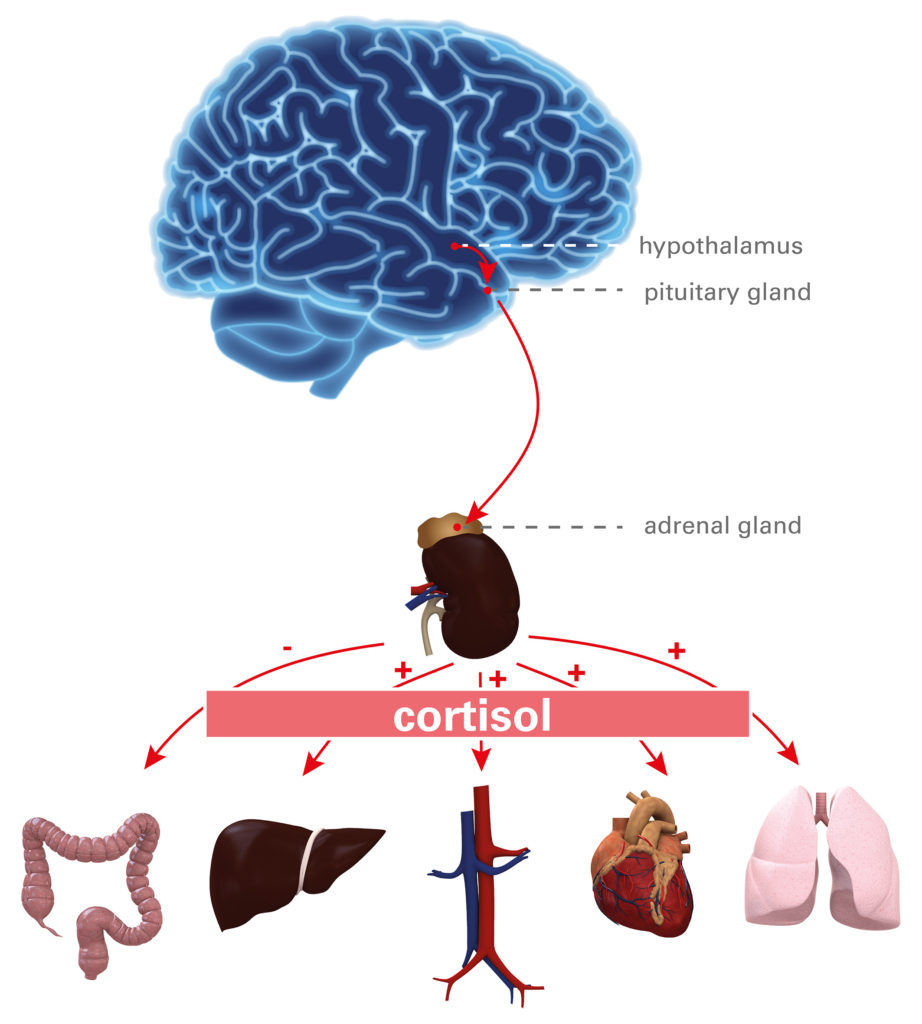The alarm didn’t go off, in the rush of the morning, the little one spilled the milk and needs changing, the car won’t start and the important meeting starts within 10 minutes! STRESS!
Stress causes unconscious physical reactions in humans: Glucose is provided as prompt energy source, blood pressure rises to assure sufficient blood supply of muscles, heartbeat and respiration accelerate, alertness is increased. Reactions which have developed in evolution to allow human ancestors being in danger to prepare for fight or flight and thus to survive still enhance performance and concentration in modern humans. Therewith, acute stress situations can be quite useful. An individual at permanent stress, however, takes serious hazards for his/her health: Women balancing between family and work just as men with overestimated capacities, perfectionists or individuals under mental (divorce, dissatisfaction at work, depression) or high physical stress (competitive sports).
 An important element in the regulation of stress response is the hypothalamic-pituitary-adrenal axis – a system comprising three endocrine glands, induced hormone cascades and feedback loops. Along this axis, stress leads to secretion of cortisol from the adrenal cortex. It activates different metabolic pathways, among these gluconeogenesis (synthesis of glucose in the liver), proteolysis (protein disassembly) and lipid metabolism. This way, especially the brain is rapidly supplied with energy. At the same time, cortisol weakens the activity of the immune system which is why it is used as immunosuppressive and anti-inflammatory pharmaceutical. Furthermore it leads to the reduction of blood supply in organ systems such as the intestines which are not essential for enhanced physical or mental activity.
An important element in the regulation of stress response is the hypothalamic-pituitary-adrenal axis – a system comprising three endocrine glands, induced hormone cascades and feedback loops. Along this axis, stress leads to secretion of cortisol from the adrenal cortex. It activates different metabolic pathways, among these gluconeogenesis (synthesis of glucose in the liver), proteolysis (protein disassembly) and lipid metabolism. This way, especially the brain is rapidly supplied with energy. At the same time, cortisol weakens the activity of the immune system which is why it is used as immunosuppressive and anti-inflammatory pharmaceutical. Furthermore it leads to the reduction of blood supply in organ systems such as the intestines which are not essential for enhanced physical or mental activity.
90% of cortisol in the blood circulation is bound to specific transportation proteins. Only 10% of the molecules circulate freely – they constitute the biologically active fraction of cortisol and due to their small size, they can diffuse in all body fluids. Hence, while determination of cortisol in serum measures the concentration of all cortisol, determination in saliva reflects the concentration of the active hormone.
Normal concentration of cortisol is subject of a distinct circadian rhythm. Shortly after waking up in the morning, the level rises rapidly and then decreases slowly during the day until the evening. Acute stress leads to temporary peaks of the cortisol concentration. Permanent (chronic) stress induces a constantly high cortisol level over a long time, until synthesis in the adrenal cortex runs out and hormone concentration decreases below the normal value.
Both continuingly too high and too low cortisol concentrations stress the organism: An increased level results in a permanent rise of blood sugar (diabetic status of the metabolism) and blood pressure, while the digestive system is disturbed due to an insufficient blood supply and the immune system is suppressed. Patients with low cortisol feel weak and unmotivated (burn-out, chronic-fatique syndrome).
Hyper- and hypofunction of the adrenal cortex (Morbus Cushing and Morbus Addison) may also be responsible for increased or decreased cortisol concentrations. Possibly, interferences of the hypothalamus or the pituitary gland, e.g. by a tumor, cause the adrenal dysfunction.
Due to its central role, cortisol is a key indicator for the stress status of an individual. Hormone concentration can be determined in saliva samples. This is beneficial compared to serum samples, because saliva can be easily taken also from children or patients afraid of injections. This way, the physician further avoids inducing an increased secretion of the stress hormone due to the blood withdrawal, which could influence the analytical result negatively. Since determination of cortisol using saliva is so simple and fast, it is also appropriate for large sample throughput in the context of medical studies, e.g. in sports medicine.

Very informative article about the cortisol